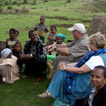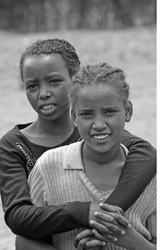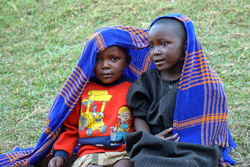Short-Term Trips, Bible Storying and Church-Planting

I (Doug) had trekked to a handful of countries on short-term mission trips in the past. These trips focused on various humanitarian efforts or maybe the occasional Vacation Bible School, but never had I thought about using short-term mission trips to do church-planting. Church-planting was for really gifted people, for the Rick Warrens and the Andy Stanleys of the world. Keenly aware of my own lack of talent and charisma compared to these men, I became convinced that church-planting was never going to be my calling.
I reasoned that if church-planting in one’s native country, using native tools and the mother tongue, was only for the truly gifted, then doing it among strange or even hostile peoples was surely for even greater giants, the saints and the martyrs. This was my conviction until I met a nine-year-old shoeless boy in Ethiopia.
A Shoeless Boy Trained to Be a Church Planter
Our small team walked down a small path that wound from the street to the front of an indigenous home. The tattered door hung from the clay walls. A thatched roof packed tightly over the sun baked walls guarded us from the night. We sat down on wooden planks and a hay mattress fashioned into a bed. The earthen walls and the black skin of our hosts blended into one indistinguishable backdrop on this dark African night. One small candle burnt low as the smell of late-night coffee and roasted home-grown grains swept in from the backroom.
Our voices and the voices of our two coworkers and interpreters were the only ones with a language we could understand. The rest blurred into a happy chatter occasioned by the laughter and cries of small children.
A boy approached one of our interpreters. “He wants to tell you a story,” the interpreter relayed to us. We agreed. The boy proceeded to perfectly recite a story from the Gospel of Mark. The room was filled by four missionaries, three pastors, a village elder and a half dozen other adults. But the boy never blinked in his telling of the story in front of this “impressive” audience. The story spoke of a man terrorized by demons who was healed through his encounter with Jesus. After telling the story, the boy walked all of us through a set of questions his father had taught him to ask whenever he had a group willing to listen.
“What do you like about the story?” the boy asked. “What do you not like or find confusing?”
He continued to ask us questions. He asked what we learned about mankind and what we learned about God through the story. He challenged us to apply it in our lives and to think about to whom we could pass the story. The boy probed us for answers and pushed us to share our thoughts.
We talked and learned together as brothers and sisters. That small thatched hut transformed into a holy sanctuary where together we learned from a story told to us by a nine-year-old boy. He was doing what he was trained to do. He didn’t know he was teaching. He didn’t know he was spiritually edifying or instructing. He was just sharing what he thought was the greatest story he had ever heard, the story of God.
The local village elder took the boy’s questions as a chance to share what he had learned from the story. He was a recent convert from Islam and was eager to learn more of the stories himself. A hush fell over the indigenous home because when a village elder speaks everybody listens. The man began to repeat a portion of the story he heard from the boy. But the boy grew uncomfortable. We didn’t know the language but we could tell there was something wrong. The boy’s youthful impatience bubbled over until he finally interrupted the elder. Shock and laughter blew through the crowd.
I asked what had happened. It turns out the elder had misremembered a point in the boy’s story and while his comments were by no means unorthodox, they betrayed he did not know the boy’s story as well as he thought he did. The boy’s father had taught him that God’s stories were the most important stories on earth and that when you tell one of God’s stories you must not let anyone change it. The boy was not willing to let even an elder change the story he told.
The elder joined in on the laughter and thanked the boy for his correction. In that one moment, the boy was more than a boy. He was a brother helping another brother to better follow Jesus. It just so happened that at that moment his brother was the village elder and he was a skinny shoeless boy who knew one of God’s stories.
The boy learned this story, as he did dozens of others, from his father. His father learned it from a neighboring village elder. That elder had learned it from an Ethiopian Christian trained to plant churches using Chronological Bible Storying among his native people. The boy was using the same methods and stories that his father was using to plant churches. While the boy’s current audience happened to be all believers in Jesus, he continued to do what he did in any context: share the stories of God’s Word. To our amazement standing in front of us, was a nine-year-old boy who was trained to be a church planter.
Partners Working Together to Train Oral Church Planters
In early 2006, the Oral Communication Strategy team at e3 Partners began looking for a place to test and implement an oral church-planting strategy. Ethiopia was soon chosen and a partner church found. The church had conditions tied to the funding. They wanted the project to focus on the most resistant Muslim people group we could find. The Ulai people boasted of a mere handful of Christian converts. They were known for their militant hostility towards Christianity, specifically in the recent killing of several missionaries and converts. Thus the Ulai seemed to qualify and were later chosen as the intended people group for this oral church-planting project.
 The initiative was to last two years. Every six months a small team of Americans would travel to Ethiopia for three weeks to teach a small group of national believers a series of stories from the Bible. Along the way, they would also instruct these national partners in how to use these stories to start story groups. Evangelism, discipleship and church-planting would all happen simultaneously in these groups. Muslims would be introduced to the gospel through stories that range from the Old and New Testaments. They would begin living out and passing on these stories even before they became believers. And when many of them did become believers, they continued meeting and passing on those stories as a new church. After implementing this strategy in their native people group, these national believers would also be responsible for passing on what they learn to teams of other believers from around the country commissioned to do the same.
The initiative was to last two years. Every six months a small team of Americans would travel to Ethiopia for three weeks to teach a small group of national believers a series of stories from the Bible. Along the way, they would also instruct these national partners in how to use these stories to start story groups. Evangelism, discipleship and church-planting would all happen simultaneously in these groups. Muslims would be introduced to the gospel through stories that range from the Old and New Testaments. They would begin living out and passing on these stories even before they became believers. And when many of them did become believers, they continued meeting and passing on those stories as a new church. After implementing this strategy in their native people group, these national believers would also be responsible for passing on what they learn to teams of other believers from around the country commissioned to do the same.
Steve Sims, with e3 Partners Ministry, was tasked with leading the project, particularly as it pertained to the biannual trainings. Various national partners and denominations helped identify the trainees. StoryRunners, an arm of Campus Crusade for Christ, partnered to provide the experience and expertise in chronological storytelling. I joined under e3 Partners Ministry just prior to the first training trip and focused on following up with the trainees in between their twice-a-year training sessions.
After the initial training, the national team found their way back to their native peoples and began implementing what they were trained to do. Scant reports filtered back to us, but the true status of things was largely unknown when the American team ventured back to Ethiopia to do the second training six months later.
As we gathered back together, we attempted to assess the progress of the initiative and soon discovered that over the previous months at least three churches or story groups had been started and several more were underway. We were shocked. Based on their experience with similarly difficult people groups, the national denomination we had partnered with warned that it would take several years before we saw the first new church, but we were now getting reports of three within the first six months.
Impressed and eager to validate the initial reports, I was sent out three months later to confirm what our national coworkers had told us. As it turned out, their initial reports were wrong. They reported that they had started three story groups. As I traveled with our national partners along the countryside, visiting home after home, village after village, I discovered ten different story groups, a mark that our national partners thought would take ten years to accomplish.
School Teacher Transforms Village with the Stories of God’s Word
One village seemed particularly striking. Up until recently, only one family in this village was Christian. The school teacher for the local elementary school had become a believer years ago and resided in this village to provide his native people with education. At various times, he had attempted to share the gospel with his neighbors but was fiercely repelled. Missionaries also came to this village but were all chased out with rocks. Still looking for a way to share the gospel with his people, the man heard about a storytelling training that Markos, one of our trainees, had conducted in a nearby village. With his interest sparked, he attended the last meeting and witnessed the trainees orally reciting numerous Bible stories. None of them could read, but now all of them were trained to be Christian leaders teaching the stories of God’s Word.
The man was impressed. He loved what he saw and wanted to bring the stories back to his village. Markos agreed to train him, and the man began spreading the stories throughout his village. Remarkably, he met no resistance. He even started classes where children of Muslim families could come and learn the stories and begin telling them to their families.
On one of my trips there, I visited this man’s village. On arriving there, everyone came out to meet us, Muslims and Christians alike. We sat in a large circle as I asked questions. The village began explaining what was occurring with the arrival of these stories. A man stood up and said, “I am Muslim. But these people [the Christians] are good people. We love their stories. We send our children to them to learn the stories. If they need anything, materials or food, we will provide what they need.”
Stunned by this Muslim man’s offer, I asked Markos why the man would offer material support to a group this village once persecuted. Markos responded, “When we carried God’s Word in our hands with Bibles, this village threw rocks at us. Now we carry it in our hearts through these stories, and they welcome us and send us their children. They love the stories of God’s Word.”
It turns out, that these Muslim people were not opposed to God’s Word, just the way in which it had been presented. Now it was finally in a language and in a form that they understood. And they loved it. And they soon began loving the God and Savior who wrote the stories.
The Stories Spread Throughout the Region
 In just six months, that one Christian family led seven other families to Christ and started the village’s first church bringing healing to a divided community. This story repeated itself dozens of times over the next several years. Young teenagers started a singing group that put the stories of the Bible to native music and traveled the countryside spreading their message. Women, previously ill-equipped to preach or even read from the Bible, now boldly shared God’s stories everyday at the wells, the marketplaces and in their homes. Old men, too old to have experienced the coming of education to their people, now found an avenue to boldly teach and spread their new found faith even though they could not sign their own names. Poor illiterate farmers, considered by most ineligible for Christian leadership because of their inability to read the Bible, now began using Bible stories to start churches in unreached Muslim villages. Village elders, once unable to communicate the truth of God found in Jesus, now boldly taught God’s stories in the local mosques. The movement quickly grew beyond our ability to track. We are hoping these simple methods could result in a true Church-planting Movement and are currently in the process of assessing whether this is actually the case.
In just six months, that one Christian family led seven other families to Christ and started the village’s first church bringing healing to a divided community. This story repeated itself dozens of times over the next several years. Young teenagers started a singing group that put the stories of the Bible to native music and traveled the countryside spreading their message. Women, previously ill-equipped to preach or even read from the Bible, now boldly shared God’s stories everyday at the wells, the marketplaces and in their homes. Old men, too old to have experienced the coming of education to their people, now found an avenue to boldly teach and spread their new found faith even though they could not sign their own names. Poor illiterate farmers, considered by most ineligible for Christian leadership because of their inability to read the Bible, now began using Bible stories to start churches in unreached Muslim villages. Village elders, once unable to communicate the truth of God found in Jesus, now boldly taught God’s stories in the local mosques. The movement quickly grew beyond our ability to track. We are hoping these simple methods could result in a true Church-planting Movement and are currently in the process of assessing whether this is actually the case.
And what about back home? American churches who thought reaching the unreached was a job only for the professional missionaries found an avenue to meaningfully engage and reach one of the most unreached and hostile people groups of Ethiopia. e3 Partners continued to help mobilize short-term teams to strategically use their time and presence to start churches in unreached areas that resulted in the genuine expansion of the Kingdom. And yes, even I learned that church-planting is not just for the Rick Warrens. It’s for nine-year-old boys, for churches and people like you willing to venture on a strategic short-term mission trip.
e3 Partners Ministry: an organization dedicated to equipping God’s people to evangelize the lost and establish new churches using short-term mission trips and church partnerships in collaboration with national partners.
StoryRunners: an arm of Campus Crusade for Christ aimed at providing access to God’s Word through story to the least-reached peoples of the world.









comments